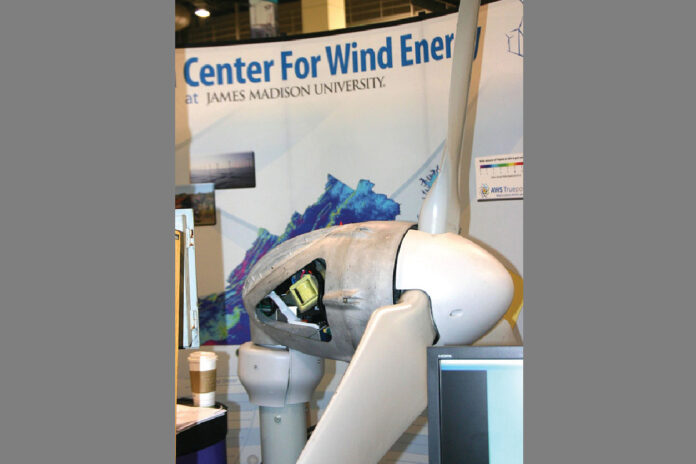
About 1500 people attended the annual Energy Expo at the Roanoke Civic Center last weekend.
Ray Ganthner, Chairman of the Virginia Energy Independence Alliance, was manning one of the booths.
“The Virginia Energy Independence Alliance is a group of concerned and interested citizens and companies that are trying to make people in Virginia aware that we are very dependent on external sources of energy for our energy in Virginia. We import more energy than any other state except California. And we think there (are) resources inside that state that we should be using to reduce our dependence on outside sources. Such as the wind energy offshore; there (are) additional things we could do with power plants inside the state, like coal powered plants. Using trash to burn to make electricity; methane generated from a landfill. There’s a large deposit of uranium not far from here that could be used to power our nuclear reactors in the state. There (are) a whole lot of opportunities that we’re just not pursuing and we should be. Because every dollar we spend on importing energy is exporting our jobs and our money outside the state.”
He says the alliance supports Governor McDonnell’s philosophy that we need to explore all types of energy.
“We try to keep those members informed about energy issues in the state and nationally because if Virginia can contribute to our own energy independence, then we can actually contribute to national energy independence at the same time.”
Ganthner says the alliance was formed two years ago and now has 1700 members.
Speaking of energy, Remy Pangle, from the Virginia Center for Wind Energy, was sharing her booth with a replica of a wind turbine.
She says the Virginia Center for Wind Energy is a group at James Madison University. They’re similar to an extension agent, for instance what Virginia Tech is to the agriculture industry.
The energy office for Virginia and the U. S. Department of energy funds the Virginia Center for Wind Energy. “But we do a lot of work and provide a lot of services to help the communities and the residents of Virginia to better understand what wind energy is; what wind farms could mean for Virginia, as well as determine if a wind turbine could be right for you at your home.”
They’ve been contacted by Floyd County and other localities to hold a public forums with experts to address residents’ concerns. “So that the public can make an informed decision rather than a decision based on opinions and mis-information.”
According to Pangle, some residents believe birds and bats will be affected, that it will increase their electric rates, that it won’t produce enough energy to be viable, that it will hurt tourism or decrease their view shed.
“I think our biggest obstacle is people just don’t want to see them. And there’s nothing we can do about that because it’s so objective. I mean, if you don’t think they’re pretty, I can’t tell you that they’re pretty. But we can just give you the facts about how beneficial they could be to your community.”
Gunther Hauk from Floyd was giving out free samples of honey. He operates Spikenard Honey Bee Sanctuary, about nine miles from Floyd.
Hauk says beekeepers are losing 33 percent of their honeybees each year nationally due to colony collapse disorder. It’s cause unknown but stress on the hive might be a factor.
“I’ve never had colony collapse disorder. I’ve never had foul brood which is almost impossible if you ask a beekeeper without medication. I haven’t had these illnesses because I treat the bees according to what they need and not what I need.”
He doesn’t take honey from some of the hives because there’s not that much of a surplus, so he has less of an income but doesn’t have to introduce a new queen into the hive each year and doesn’t lose as many bees from diseases that other beekeepers do.
“(The sanctuary is) different from an apiary or commercial or hobby bee keeping in that we don’t take more honey than what they readily give. In other words, we don’t feed sugar, we don’t raise queens artificially; we don’t give plastic foundations; we travel with them.”
Hauk says they help the bees “do their thing.” “We have medicinal teas to strengthen their immune system. We have a lot of forage for them; a lot of medicinals that we are planting especially for them; acres-wise.”
They’re leasing 25 acres and 5 of those are farmed especially for the bees. He’s been a beekeeper for 37 years and he gave the first sustainable beekeeping workshop in the U. S. in 1996. He’s also written a book in 2002 about saving the honeybee. That was before colony collapse disorder evolved. “I knew what was coming . . . I just didn’t know the name of it.”


